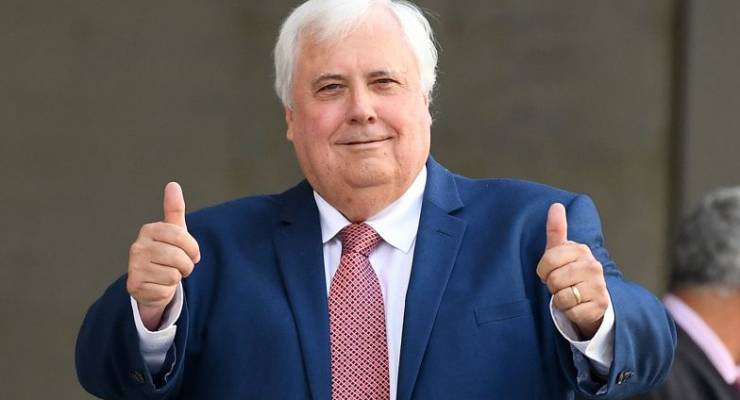
‘Bad for what ails ya!‘
At the moment Clive Palmer is best known as the nation’s premier old-timey medicine show proprietor, taking out full-page ads trumpeting his purchase of stockpiles of the Trump-approved COVID-19 not-cure hydroxychloroquine, which is currently dazzling researchers with its failure to show any therapeutic benefit beyond hastening the deaths of US veterans suffering from the virus.
But the triumph of having his advertisements cleared by the Therapeutic Goods Administration is a rare win for the man who, it turns out, spent over half a million dollars backing five candidates in the recent Queensland local elections which ended in victory for exactly none of them.
Most notably, Palmer’s attempt to install rugby league legend Greg Dowling as mayor of Townsville cost him an impressive $102,833.33, garnering almost 16,000 votes at around $40 a pop. Which is pretty expensive, especially since Dowling didn’t come close to the 46,691 votes by the actual winner: incumbent mayor and long time Palmer bête noire Jenny Hill.
Still, the 2019 federal election cost him around $83 million for no victories — so $500,000 for no victories is what, 166 times more efficient?
Islands in the stream
While Queensland is often portrayed as Australia’s home of the gerrymander, South Australia has a rich and storied history of its own.
Why, pioneering premier Thomas Playford used his artistic flair for redrawing unfavourable electorate boundaries to enjoy a 27 year stint as state leader long before Joh Bjelke-Petersen even stumbled into the Queensland legislature.
And so there’s a certain nostalgia being evoked at the moment as the Liberal state government and Labor opposition tussle over the shape of SA’s electorates ahead of the 2022 election.
And, somewhat surprisingly, Kangaroo Island is shaping up as one of the spoils of this particular war.
At the moment KI is part of the state Division of Mawson, which covers the island and the Fleurieu Peninsula from Cape Jervis (where one gets the ferry to KI) up to the vineyards of McLaren Vale. It’s currently held narrowly by Labor.
However, Energy Minister Dan van Holst Pellekaan has made a submission to the electoral boundary review that the island should be made part of the massive Liberal-held Division of Flinders, which covers the Nullarbor Plain from the WA border along the south coast through the Eyre Peninsula.
Which is an odd potential addition since it’s just under an 11 hour drive from island to electorate — or, alternatively, a very bracing, challenging and shark-rich swim.
How that’ll play out remains to be seen, but what’s almost certain is that SA will lose at least one state seat, reflecting the shrinking population in rural areas. As in, folks are leaving and not returning — not that they’re getting physically smaller. That, ironically, would probably be a real regional drawcard once travel restrictions are lifted.
You can stop the music
While there is absolutely no certainty on how or when restrictions on social activities might be lifted as we tempt fate with talk of such things, there’s one thing that everyone pretty much agrees upon: live gigs in sweaty rooms where everyone is breathing each other’s lung-juice for hours at a time are going to be among the very, very, very, very last things to come back.
And that’s a huge problem for the venues containing said sweat-rooms, and who were already doing it tough in many cases, due to predatory developers whacking up buildings next to them and going, “Oh, I’m sorry, didn’t see you there — here’s the noise complaints we’ve submitted to council, be a dear and close down your business.”
And the first cracks are starting to show. The folks at the Gasometer Hotel in Collingswood are getting out, with Melbourne music fans weighing up whether to crowdfund the purchase of the license. Adelaide’s Governor Hindmarsh Hotel is predicting it’ll be one of many venues to face closure within months if artists remain unable to tour — which seems all but certain right now.
Meanwhile the initial hopes that Brisbane’s Fortitude Valley might start reopening by May 1 have proved wildly optimistic.
There’s currently an attempt by Music Victoria to legislate protections to stop opportunists stripping away the inner-city venues in Melbourne until things open back up, but the longer this goes on, the less likely it seems that the national live music scene will survive.
Of course, forward-thinking Sydney neatly sidestepped the issue by following pokies and developers with casino-excluding lockdowns in most of what used to be its premier entertainment districts.
No point protecting venues you no longer have, right Gladys?








South Australia’s electorates and the gerrymander history are a pointer to the fact that the state itself needs an overhaul.
Over 4/5 of the SA population live in Adelaide-it is an unworkable failed state.
I suggest that the boundaries are redrawn. A horizontal border line drawn above Adelaide, with the territory north of this going to the NT, and South of this line going to Victoria.
One state government less, and better governance all round.
Wow. So, I wonder which side you end up on…?
Perhaps we could draw the line underneath Adelaide…
Don’t forget the Goyder Line, as whining farmers have done for 150yrs despite his (Surveyor-General) warning.
Re: SA; absolutely it’s a drawcard and one that many residents cherish (hard as it might be to understand from people on the east coast)
Don’t under estimate the snake oil shiller.
Palmer spent almost $90 million at the federal election to buy preferences that got the LNP over the line in Q’land .. and got him the mine infrastructure he wanted.
As to the hydroxychloroquine debacle and the TGA, that will have to be investigated when the dust settles.
Palmer got what he really wanted though, which was the LNP in power to help his coal mining interests.
Re “Stopping the Music” – as an venue operator I agree with the view that we will be the very last thing to be given the medical ok to resume, depressingly it also will coincide with similar public reluctance when it comes to crowds in general. What could help is targeted govt support to artists to continue their music perhaps replicating the jobkeeper program and support for outdoor events over summer to help sustain the creative support industries. Fortunately (or maybe not) most of us have become quite adept at running things on the smell of an oily rag so the govt could get good value for money, certainly compared with the sort of money it throws at other industries.
I cannot understand why thousands of passive people being ripped off by outrageous ticket prices is a “good thing”.
The point of Woodstock, a thousand years ago… or so it seems, was that it was meant to be a coming together of people to share their arts, including musical skills – see the original poster.
Instead it was half a million kidults sitting around in the mud for three days demanding to entertained whilst grown-ups fed & watered them.
Good riddance.